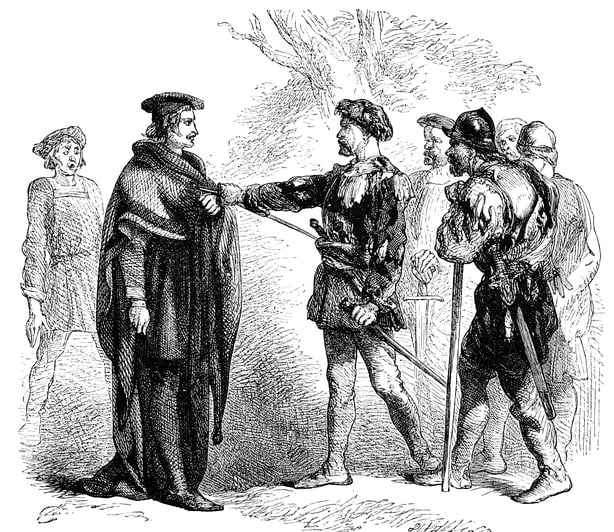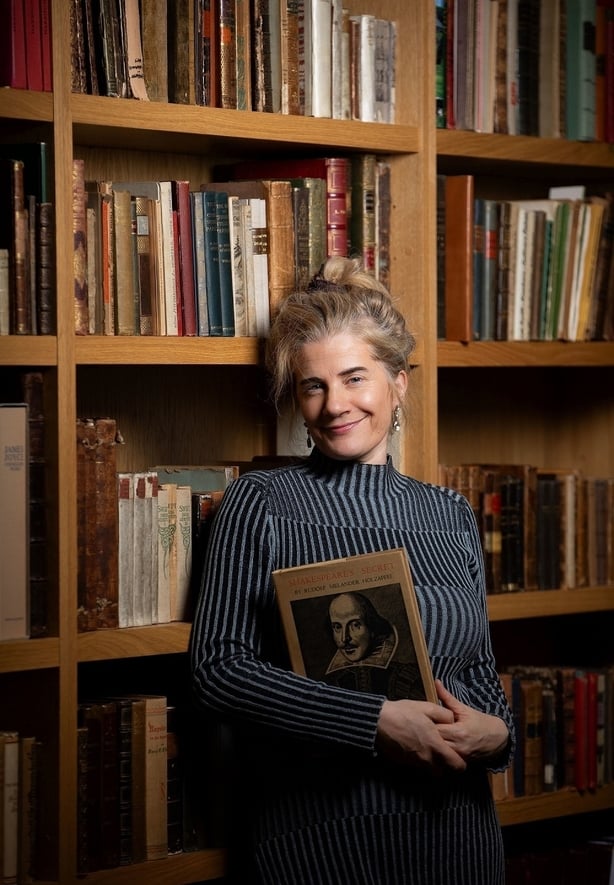A pioneering project by a lecturer at University of Limerick has seen William Shakespeare's sonnets translated into Irish using iambic pentameter.
"This is the future of the Irish language, this is where the opportunities are," dar le Sorcha de Brún, léachtóir Litríochta agus Teanga na Nua-Ghaeilge in Ollscoil Luimní, atá tar éis aistriúcháin a dhéanamh ar roinnt des na soinéid ag Shakespeare ón mbun-Bhéarla go Gaeilge.
Sé an peintiméadar iambach a d'úsáid sí - an mheadaracht nó rithim arbh gnáth le Shakespeare a úsáid ina chuid saothar.
Dr Sorcha de Brún, UL lecturer in Modern Irish Language and Literature, has translated several of Shakespeare's sonnets from English to Irish using iambic pentameter – a rhythm or 'meter' the Bard famously used in his works.

Radharc as The Two Gentlemen of Verona le Bhfuilim Shakespeare.
Is trén traschruthú a thagann forbairt ar an aistriúcháin, mar a mhíníonn de Brún.
"I think literature will always need translators, and this is where transcreation comes into its own, where you not only translate the language, but translate the culture as well."
"It's not just about translating the language, but about making a plethora of choices around how you are going to mediate the target and source languages also," she said.
Mar shampla, deir sí go mbaineann Shakespeare úsáid as éanlaithe ar leith, ach bheartaigh sí féin ar fhocal eile a úsáid san aistriúcháín Gaeilge aici ar dhá chúis; an chéad cheann ná gur éan dúchasach a bheadh ann agus an tarna cheann mar go ndeachaigh sé leis an mheadaracht.
"I think this is one of the most interesting and enjoyable aspects of literary translation."

"For me the contemporary language is exactly about this kind of thing, having to consider so many different aspects to the language, in terms of geography, history, science. The list goes on, and it is what I believe counts in terms of the survival of the language."
Foilsíodh an chéad cheann acu seo san iris COMHAR, agus tuilleadh le bheith foilsithe ar ball.
Soinéad 29
('When in disgrace with fortune and men's eyes’).
Is míchlú orm gan rath i súile fear,
Ag caoineadh staid seo dom curtha le fán,
Is buairim neamh nach dtugann ach cluas bhodhar,
Ag smaoineamh orm, mo mallacht ar mo dhán,
‘Súil gur cosúil leis mé lena dhóchas,
A chuntanós eisean, na cairde dó,
Ealaíon an fhir thall is scóip an tsaibhris,
A dtaitníonn liom is mó, is lú an só;
Fós sa mhachnamh dom, nach mór féinfhuath,
Cuimhním ort le sult, imíonn mo náire,
Mar éan ag ardú leis sa spéir go luath,
As ithir dhuairc a cheol ag geataí Glóire;
Mar ’s é do ghrá mo shaibhreas ins an oíche,
Is diúltaím staid seo dom a mhalartú le ríthe.
We need your consent to load this rte-player contentWe use rte-player to manage extra content that can set cookies on your device and collect data about your activity. Please review their details and accept them to load the content.Manage Preferences
Sonnet 29
When in disgrace with fortune and men's eyes.
When, in disgrace with fortune and men's eyes,
I all alone beweep my outcast state,
And trouble deaf heaven with my bootless cries,
And look upon myself and curse my fate,
Wishing me like to one more rich in hope,
Featured like him, like him with friends possessed,
Desiring this man’s art and that man’s scope,
With what I most enjoy contented least;
Yet in these thoughts myself almost despising,
Haply I think on thee, and then my state,
(Like to the lark at break of day arising
From sullen earth) sings hymns at heaven’s gate;
For thy sweet love remembered such wealth brings
That then I scorn to change my state with kings.







